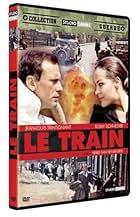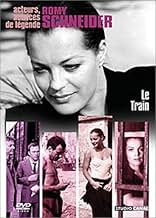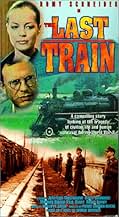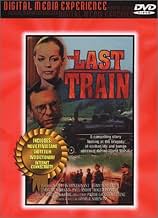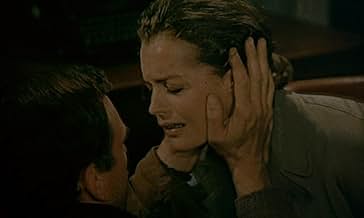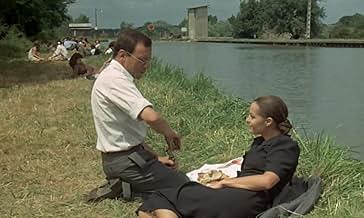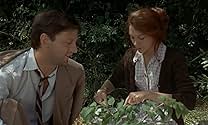IMDb रेटिंग
6.9/10
1.9 हज़ार
आपकी रेटिंग
अपनी भाषा में प्लॉट जोड़ेंTwo people, a Frenchman Julien Maroyeur and a Jewish German woman (Anna Kupfer) met on a train while escaping the German army entering France.Two people, a Frenchman Julien Maroyeur and a Jewish German woman (Anna Kupfer) met on a train while escaping the German army entering France.Two people, a Frenchman Julien Maroyeur and a Jewish German woman (Anna Kupfer) met on a train while escaping the German army entering France.
- पुरस्कार
- कुल 1 नामांकन
फ़ीचर्ड समीक्षाएं
10myschrec
May 1940. The Germans invade France and thousands flee on trains heading for safety. A man is separated from his pregnant wife and young daughter. He meets a woman on the train and protects her. She is a German Jew -- suspected by the French -- and wanted by the Nazis.
With actual footage from WWII, this film feels more like a documentary, which of course adds to the drama. The characters -- even the minor ones -- are well drawn and evoke sympathy. Romy Schneider -- a beauty in so many other films -- displays her incredible acting prowess. And Jean-Louis Trintignant, who became well known after "Z" (1969) and "The Conformist" (1970), is incredible: low-keyed, soft-spoken and poignant. Can two people fall in love so quickly? Under such dire circumstances that keep getting worse, this strange romance seems so real.
For the most part, this is not a Holocaust film ... nor a film about Nazi atrocities. But the fear of German aggression is palpable. One character tells another -- as they see the results of the German aircraft bombing: "Close your eyes, you'll never know it happened." This is what all refugees desire -- to escape and forget. But this is a film that doesn't want you to forget the prejudice, selfishness, and other horrors of war. But it also reminds you of the gentleness and humankindness.
"It's them. I'd recognize that sound anywhere." I am reminded of the Holocaust survivor who could not sleep for years because of the sounds she heard in her dreams/nightmares.
The last seven minutes are some of the most frightening and intelligent minutes dealing with the Holocaust even put on film The scene is fraught with danger and filled with possibilities. The ethical dilemma will generate hours of thought and discussion.
With actual footage from WWII, this film feels more like a documentary, which of course adds to the drama. The characters -- even the minor ones -- are well drawn and evoke sympathy. Romy Schneider -- a beauty in so many other films -- displays her incredible acting prowess. And Jean-Louis Trintignant, who became well known after "Z" (1969) and "The Conformist" (1970), is incredible: low-keyed, soft-spoken and poignant. Can two people fall in love so quickly? Under such dire circumstances that keep getting worse, this strange romance seems so real.
For the most part, this is not a Holocaust film ... nor a film about Nazi atrocities. But the fear of German aggression is palpable. One character tells another -- as they see the results of the German aircraft bombing: "Close your eyes, you'll never know it happened." This is what all refugees desire -- to escape and forget. But this is a film that doesn't want you to forget the prejudice, selfishness, and other horrors of war. But it also reminds you of the gentleness and humankindness.
"It's them. I'd recognize that sound anywhere." I am reminded of the Holocaust survivor who could not sleep for years because of the sounds she heard in her dreams/nightmares.
The last seven minutes are some of the most frightening and intelligent minutes dealing with the Holocaust even put on film The scene is fraught with danger and filled with possibilities. The ethical dilemma will generate hours of thought and discussion.
France during 1940 to 1943 as seen by the acute observer Georges Simenon, an author who wrote the Maigret series, admired for his penetrating insights into the traditional lives of the French. It should be remembered by non-French viewers, that the French remember their dead from The Great War (WW1) on crosses and plaques in almost every village in France. (America came to understand this on 9/11, though only three places were hit.) Also that WW1 was fought on French soil. Twenty years later they are invaded again. (Maybe they should be blamed for that because of their vengeful Versaille Treaty.) Remember also that President de Gaulle (centre right) and President Mitterand (socialist) refused to take up the accusations of France caving into Hitlers demands and becoming a puppet regime under the name of Vichy which incorporated into its own laws the Nazi anti-Jewish programs. Against this essential background, there are two of Europe's most subtle actors, Jean-Louis Trintignant and Romy Scheider, who give a haunting performance of pathos and love. They flee by a "last" train northern France in 1940, before Paris falls, to the west coast La Rochell (incidentally, the town to be the German submarine base dramatically filmed in Das Boot). Trintignant with other men and unaccompanied women have to make do in a wagon for horses. This is a significant image. Other important images are the changing countryside, the generosity of the French, the first criminal acts of war of Luftwaffe planes shooting on civilians. Trintignant shows kindness, consideration and courage in protecting Romy Schneider. The rhythm begins to liken Ravel's Bolero: he is traditional parochial French, married with children (who are in the train's better compartments), he is inexperienced with other women, ignorant of world events, so he reflects the very subdued key of the beginning of Bolero; she is a German Jew, internationally experienced, knows men, has the instinct of survival. She adds to the sharper tones in Bolero. Their relationship develops in the wagon. He is more careful to transgress marriage boundaries, she does not want to comprise him, but both slowly are drawn to each other in the steady mounting Bolera rhythm. In the wagon, others engage in sexual intercourse and soon she realizes that she must make the first move. She understands that life is to be lived each minute and so their growing love, reaching new rhythmic heights, is consummated. All is natural, natural as horses in a wagon. No morality, no anglo-saxon prudery, just natural, as one understands this on continental Europe and in the East. The bolera rhythm reaches its climax in the last minutes. Three years he has not seen her. When he was reunited with his wife and new born child in La Rochelle she on her own accord left unseen. He is called to the French National Police. The French police worked in close agreement with the Gestapo (the security police arm of the Nazi Party) and just this aspect so ignored by Presidents de Gaulle and Mitterand is where author Georges Simenon subtedly puts in the knife. At the interview, he is confronted with her, arrested for being a Jew with the French Resistance. He denies the French Secret Service Police inspector's questions, but when she is brought in, the climax and (the Boleros crescendo) is released: the last scene is so powerful, love, the essence of life, is dealt doom. Essential to see, for so many lived that life!
And also the most known French film about the 1940 French exodus, trying to escape from the Nazi invasion. You had EN MAI FAIS CE QU'IL TE PLAIT, back in 2015, also a very good movie, with the same settings. The other strength of this movie, besides the gripping story, is that the director Granier Deferre was only 13 years old at this time and actually lived this tragic period. So, he was the best placed to provide many of accurate details, that would probably not have been shown in another feature. For instance, those women who took advantage of the train stop, in the middle of the country side, to take a pee, in a field. Then a nazi plane arrives and bombards the area. Three seconds later after the smoke has left, we see the two cadavers of the poor women. Or the scene of a man, also taking a pee, standing between wagons, during a train stop ( of course;;;) Some folks have said that you have some lengths in the film, I agree, but in this kind of feature, lengths are sometimes unavoidable. If you had filled this film with plenty of action sequences, would that had been credible? Hell no. A memorable ending that would have made, even a Waffen SS trooper weep. Believe me.
... one of Hollywood's favourite blends. Luckily, this is not a Hollywood movie but a french one; luckily, its bitter realism wins over the sweet moving moments in one of the best-acted cinematic love stories ever. Romy Schneider and J.-L. Trintignant give a performance you won't forget even when you have forgotten most details and plot elements of this simple, but convincing film.
Unusual but not terribly compelling WWII drama almost wholly set aboard a train (transporting French people fleeing from the oncoming Nazi invaders). The film's core is the budding romance between fellow passengers Jean-Louis Trintignant (whose pregnant wife and young daughter are staying in a different compartment and eventually get 'lost' along the way) and Romy Schneider, a German-Jew war widow.
Despite a busy narrative - Trintignant stepping down at every station to ask for the possible whereabouts of his family, Schneider being picked on by a group of loutish passengers in view of her aristocratic airs (meanwhile, an ageing prostitute is all-too-willing to render her services free of charge in such hard times!) and for whom the usually meek Trintignant stands up, a rather underdeveloped subplot involving young single mother Anne Wiazemsky (then still married to Jean-Luc Godard), etc. - the tone of the film is too glum and the treatment too conventional to generate much audience involvement; that said, the interspersing of black-and-white newsreels of similar events from the era was an inspired touch and the scene in which the train comes under aerial attack from the Nazis, leaving numerous victims, is nicely handled (even if the moment when a couple are mown down while relieving themselves in an open field comes off as unintentionally funny!). Besides, the film has other virtues in the pleasant countryside photography of Walter Wottitz (an expert in WWII-based films, among them John Frankenheimer's THE TRAIN [1964] - which was actually filmed in France!) and a lush score from Philippe Sarde.
An interesting moment in the film occurs when Trintignat scoffs at Schneider's recounting of how the Nazis intended to exterminate the Jewish population, which gives credence to the notion that the world only became aware of the full extent of the Holocaust after the war was over. When the train arrives at its destination, Trintignant is re-united with his family (including a new-born son) - but not before having passed off Schneider as his wife to the Gestapo officials! At the end, however, when she's captured as a member of the Resistance they're somehow able to link her back to him and the couple are brought together for questioning...
Despite a busy narrative - Trintignant stepping down at every station to ask for the possible whereabouts of his family, Schneider being picked on by a group of loutish passengers in view of her aristocratic airs (meanwhile, an ageing prostitute is all-too-willing to render her services free of charge in such hard times!) and for whom the usually meek Trintignant stands up, a rather underdeveloped subplot involving young single mother Anne Wiazemsky (then still married to Jean-Luc Godard), etc. - the tone of the film is too glum and the treatment too conventional to generate much audience involvement; that said, the interspersing of black-and-white newsreels of similar events from the era was an inspired touch and the scene in which the train comes under aerial attack from the Nazis, leaving numerous victims, is nicely handled (even if the moment when a couple are mown down while relieving themselves in an open field comes off as unintentionally funny!). Besides, the film has other virtues in the pleasant countryside photography of Walter Wottitz (an expert in WWII-based films, among them John Frankenheimer's THE TRAIN [1964] - which was actually filmed in France!) and a lush score from Philippe Sarde.
An interesting moment in the film occurs when Trintignat scoffs at Schneider's recounting of how the Nazis intended to exterminate the Jewish population, which gives credence to the notion that the world only became aware of the full extent of the Holocaust after the war was over. When the train arrives at its destination, Trintignant is re-united with his family (including a new-born son) - but not before having passed off Schneider as his wife to the Gestapo officials! At the end, however, when she's captured as a member of the Resistance they're somehow able to link her back to him and the couple are brought together for questioning...
क्या आपको पता है
- ट्रिवियाAs Granier-Deferre had been part of the Exodus (at the age of 13), he was able to add a lot of personal observations to his description of the flight (such as people remaining cheerful despite the tragedy of the situation, nuns picking flowers in a field during a bombing raid, ...)
- कनेक्शनFeatured in Romy, femme libre (2022)
- साउंडट्रैकL'Attaque
Written and Performed by Philippe Sarde Et Orchestre
टॉप पसंद
रेटिंग देने के लिए साइन-इन करें और वैयक्तिकृत सुझावों के लिए वॉचलिस्ट करें
- How long is The Last Train?Alexa द्वारा संचालित
विवरण
- रिलीज़ की तारीख़
- कंट्री ऑफ़ ओरिजिन
- भाषा
- इस रूप में भी जाना जाता है
- The Last Train
- फ़िल्माने की जगहें
- Saincaize-Meauce, Nièvre, फ़्रांस(mined railroad bridge)
- उत्पादन कंपनियां
- IMDbPro पर और कंपनी क्रेडिट देखें
- चलने की अवधि
- 1 घं 35 मि(95 min)
- रंग
- ध्वनि मिश्रण
- पक्ष अनुपात
- 1.66 : 1
इस पेज में योगदान दें
किसी बदलाव का सुझाव दें या अनुपलब्ध कॉन्टेंट जोड़ें

